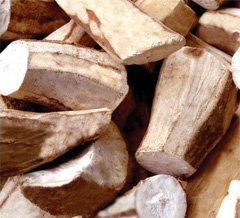Africa's Slow Food Revolution

 |
| Dry Cassava: Iocal African food Photo:Courtesy |
The reawakening of interest in African indigenous foods is evident in a panoply of initiatives and approaches, including agroforestry, permaculture and organic agriculture, all dedicated to producing healthy, locally-grown food and fostering nutrition security. Efforts to strengthen indigenous national and regional cuisines include encouraging local markets, communal tastings, conferences, debates, workshops in school canteens and using magazines to promote the idea of "eating local". These campaigns are raising public awareness of the social impact of food traditions and the importance of local consumption in order to support traditional food production.
Signs of the times
Last year, 25 Tanzanians attended the Slow Food Movement's annual gastronomic gathering in Turin (Italy). Amongst them was organic farmer and activist Hawa Kimolo of the Hibiscus growers and processors, which produces herbal tea, jams and drinks. She confirmed that across East Africa, shops selling organically-produced local fruits and vegetables are attracting customers, especially amongst wealthier families. At the same time there is a renewed focus on undervalued, underutilised and neglected crops and species.
The regional PELUM Association[1] organised its most recent symposium in Morogoro, Tanzania, on 'Traditional and diverse foods from and for Africa' (TRADIFFA). The theme was 'promoting indigenous under-utilised species as the most viable means to food security, sovereignty as well as human and environmental health'. The aim was to raise awareness of the potential that the consumption of more diverse food, grown through sustainable agricultural practices, has to offer the development of Africa.
PELUM Botswana, for instance, has been pursuing a strategy of commercialisation to promote indigenous eating habits. They have registered success with wild foods such as marula fruit (from the Sclerocarya birrea tree) and bushveld melon (Citrullus lanatus), and also with increased adoption of sorghum, which is milled and used in fermented sour porridge and in a traditional alcoholic brew drunk at weddings.
There has also been some success in Zimbabwe distributing traditional recipes to women. Likewise in Kenya leafy vegetables, such as the African spider flower (Cleome gynandra L.) and African nightshade (Solanum villosum and S. scabrum), which are drought-tolerant and can grow in poor soil, are being successfully promoted as a means to improve nutrition and reduce crop failure. Although Kenya has recorded 210 species of African leafy vegetables, only around ten ever reach the market.
Abundance of local species
Beyond these, there is an enormous range of species that have historically been grown by rural people to supplement their diet, and many poor households have them growing already. The vegetables that are gaining popularity at the moment - including African nightshade, pumpkin leaves, cowpea leaves, African eggplant and sweet potato leaves - have a long history of cultivation in households and exchange amongst neighbours.
There are also plenty of plant protein sources that require minimal inputs, grow in abundance and improve soil fertility through nitrogen fixation. These include pigeon pea (Cajanus cajan), cowpea (Vigna unguiculata), green gram (Vigna radiata), and bambara groundnut (Voandzeia subterranean), which can all be used to make delicious dishes with coconut milk, sesame or groundnut sauces. Bambara groundnut seeds are rich in protein (24 per cent) with higher levels of the essential amino acid methionine than most other grain legumes.
According to Nobel Peace Prize winner Wangari Maathai, of Kenya's Green Belt movement, strengthening traditional food culture can provide fast relief to the world's food problems. "We're used to adopting foodstuffs from other regions and do not invest in research and development of food crops that are better adapted to the environments in which we live," she says.
For the majority of Africans to join the slow food revolution, there would need to be a concerted campaign to change eating habits and promote locally-produced indigenous crops. For the Slow Food campaigners, the message is clear and simple: traditional foods are healthier, cheaper and locally available. And, in a time of rising fertiliser prices and failing rains, they might be the best option for the growers as well.
[1] A member-driven organisation that offers a learning and networking platform for NGOs and farmers active in eastern and southern Africa.
By Petra Bakewell-Stone
First published in the New Agriculturist
